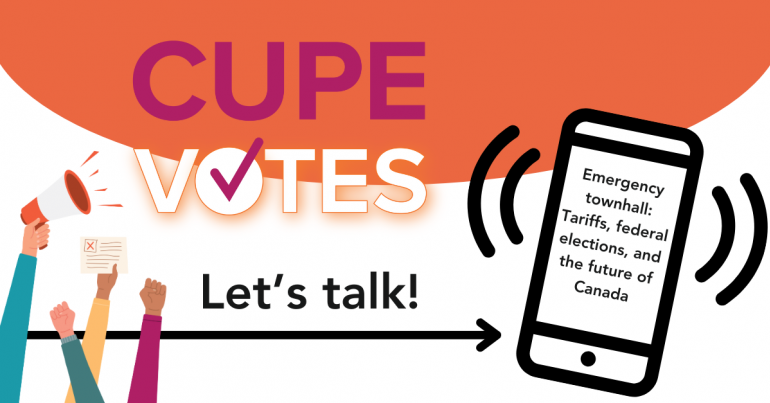TO ALL CUPE CHARTERED ORGANIZATIONS
Dear sisters, brothers and friends,
In the 2019 federal election, CUPE members, elected officials and staff will be active in many ways - as candidates, volunteers, voters and trade unionists. Here is a guide to navigate the Canada Elections Act as it relates to our union’s political participation in the election. This legislation requires organizations that wish to communicate about the election to register as a third party and report specific spending and activity. It has seen many modifications this year, and now captures a broader array of activities over a greater period of time.
Please review this guide closely, and contact us if you have questions.
- There are very strict new rules around the election. There are now two periods where CUPE’s political participation must be registered with Elections Canada and is subject to spending limits. The first period is the pre-election period, which began on June 30th and concludes when the writ drops and the official campaign begins. The second period is the election period which begins when the writ drops and concludes on election day.
- From June 30th until election day, CUPE National will be registered as a third party on behalf of all of its chartered bodies, including all locals, divisions, councils, etc. CUPE National, as the registered third party, must pre-approve all spending associated with regulated activities under the Canada Elections Act. As in previous federal elections, it is critical that locals, divisions and councils do not engage in regulated activities without pre-approval. Any such activities could tip CUPE National’s total spending over our limit. Overspending carries large financial and other penalties. During this time, third party spending includes political advertising in support of or against a candidate or political party. Issue-based campaigns (messages in support of an issue, such as universal pharmacare, that may be associated with a candidate or party) don’t count toward third-party limits as long as they do not constitute advertising.
- The distribution of printed materials is an effective way of participating in an election and showing our support for the NDP. However, the costs of both creating and distributing the materials may be subject to spending limits. Please be sure to contact your Regional election lead or CUPE National for advice about campaign materials, as you develop your election plans.
- Calling our members is another effective way to engage them in the election campaign but, as with materials, the associated costs may be subject to spending limits. There are also detailed rules for engaging with our members in this way, including clearly identifying who is making the calls, keeping records of the calls, and registering our activity with the CRTC. As with campaign materials, please contact your Regional election lead or CUPE National for guidance, before you begin any phone calls.
- The creation and distribution of partisan online materials are regulated and subject to spending limits. This includes supporting candidates or parties on issues on your union’s or local’s website, social media and through email.
- No collusion. The rules also prevent us from working with other third parties or registered parties (i.e. the NDP) to circumvent the spending limits. We also can’t collaborate with others to influence their activities related to the federal election. For example, a party can’t ask us to share a specific message with our members. But if they share their platform points with us, we can write to our members about why we support the party and their platform.
- Union staff, elected officials and members can volunteer on any campaign. Volunteering means you are using your own time (including non-working hours, vacation or casual days) to support a candidate or campaign. If a campaign wants you to work full-time, the campaign must reimburse your employer for all your wages and benefits. For CUPE staff, all such requests must go through CUPE National.
- Union staff, elected officials and members are allowed and encouraged to become party members and to make donations to candidates or a political party. Unions – including locals, divisions and councils – cannot make donations to parties or candidates, whether monetary or “in kind”. “In kind” donations include material, property or services. This means, for example, that a local union cannot donate office space or printing services to a campaign – the campaign would have to pay for them.
- Union staff, elected officials and members can run for nomination and be candidates for election.
- As a union, our staff, activists and members have every right to – and should – be politically engaged and involved! Although there are some restrictions on how we can do that, we have the opportunity to make a real difference in this election. We have provided you with some ideas to get you started. Look for information online and in CUPE Today. There’s more to come!
Remember, it’s better to be safe than sorry. If you have any questions or are at all uncertain about how the new and existing rules impact your work and activism for the election, please consult CUPE National. Send your election-related questions to politicalaction@cupe.ca.
Produced by CUPE for CUPE members.



